通用版 小学英语小升初专项复习-形容词&副词 课件(共23张PPT)
文档属性
| 名称 | 通用版 小学英语小升初专项复习-形容词&副词 课件(共23张PPT) |  | |
| 格式 | pptx | ||
| 文件大小 | 4.3MB | ||
| 资源类型 | 试卷 | ||
| 版本资源 | 通用版 | ||
| 科目 | 英语 | ||
| 更新时间 | 2022-12-12 09:47:25 | ||
图片预览

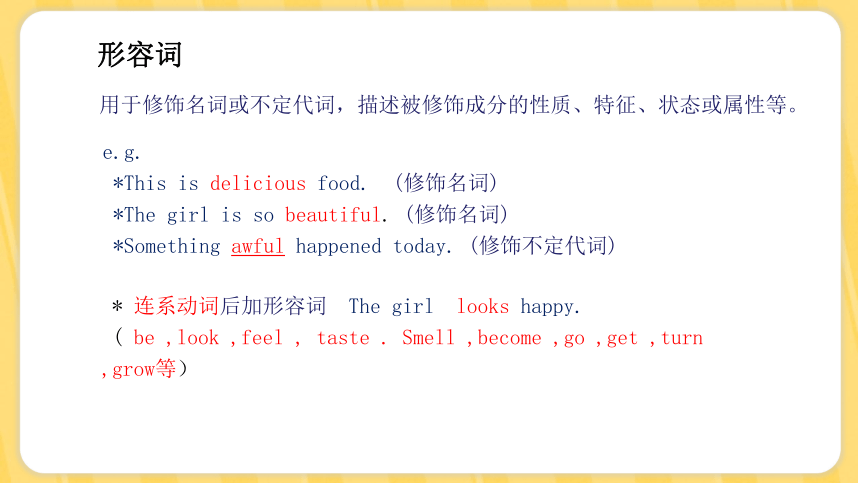
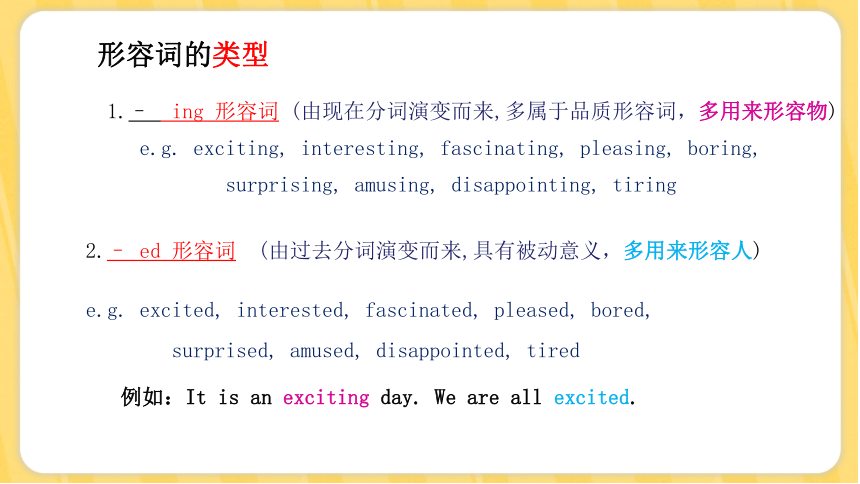
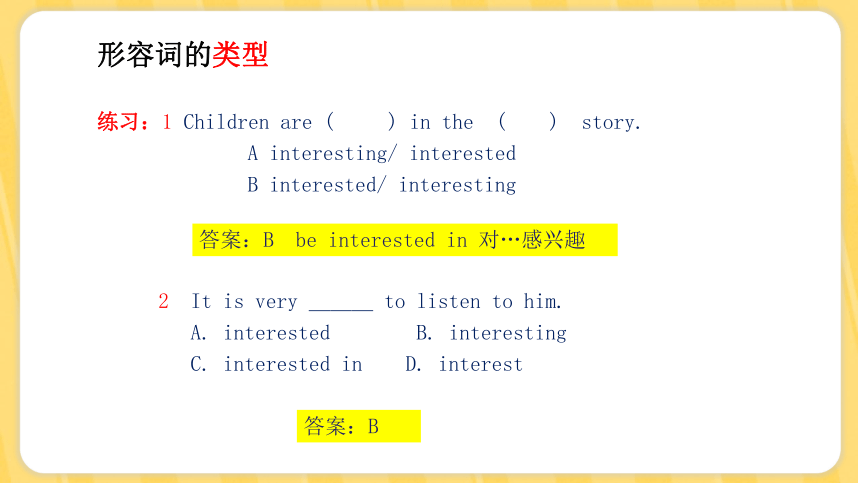
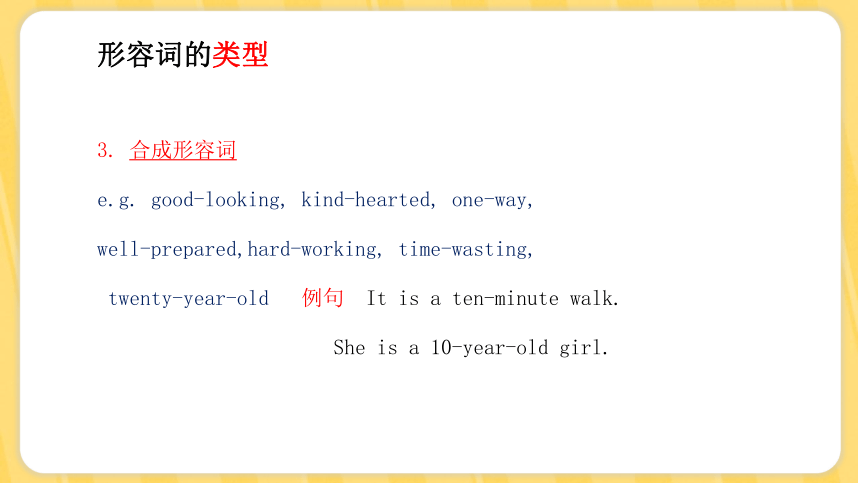
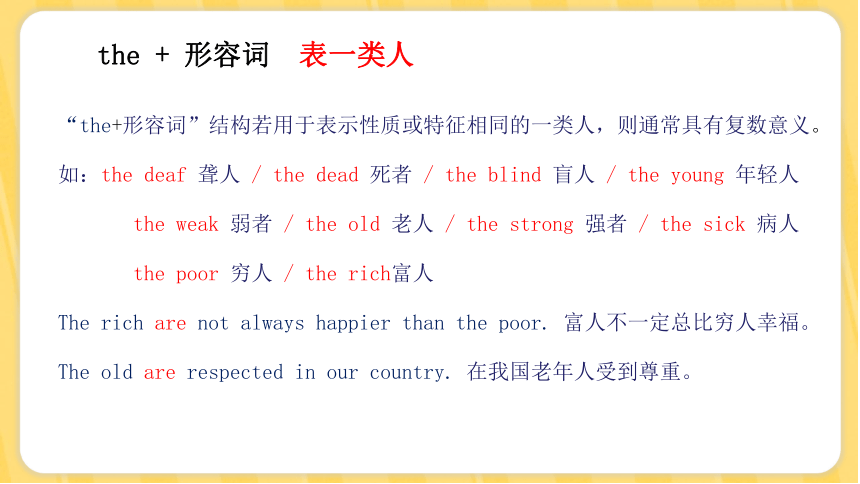
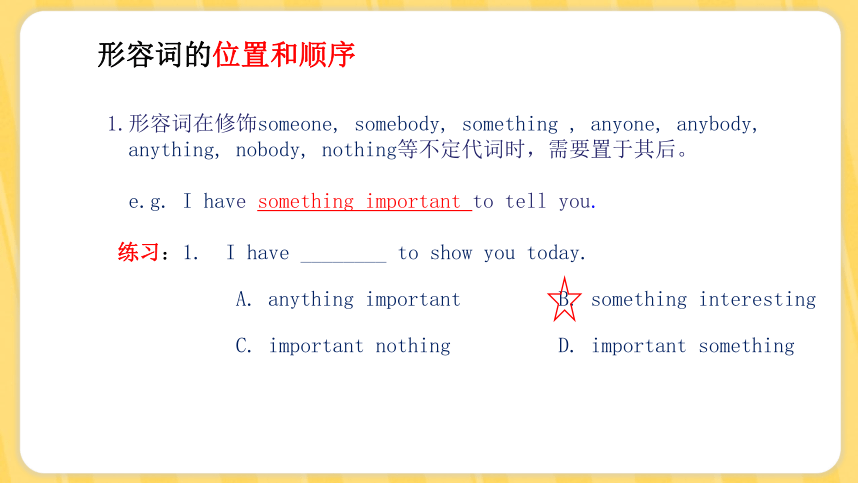


文档简介
(共23张PPT)
小升初专项复习
----形容词,副词
形容词
用于修饰名词或不定代词,描述被修饰成分的性质、特征、状态或属性等。
e.g.
*This is delicious food. (修饰名词)
*The girl is so beautiful. (修饰名词)
*Something awful happened today. (修饰不定代词)
* 连系动词后加形容词 The girl looks happy.
( be ,look ,feel , taste . Smell ,become ,go ,get ,turn ,grow等)
形容词的类型
1.– ing 形容词 (由现在分词演变而来,多属于品质形容词,多用来形容物)
e.g. exciting, interesting, fascinating, pleasing, boring,
surprising, amusing, disappointing, tiring
2.– ed 形容词 (由过去分词演变而来,具有被动意义,多用来形容人)
e.g. excited, interested, fascinated, pleased, bored,
surprised, amused, disappointed, tired
例如:It is an exciting day. We are all excited.
形容词的类型
练习:1 Children are ( ) in the ( ) story.
A interesting/ interested
B interested/ interesting
2 It is very ___ to listen to him.
A. interested B. interesting
C. interested in D. interest
答案:B be interested in 对…感兴趣
答案:B
形容词的类型
3. 合成形容词
e.g. good-looking, kind-hearted, one-way,
well-prepared,hard-working, time-wasting,
twenty-year-old 例句 It is a ten-minute walk.
She is a 10-year-old girl.
the + 形容词 表一类人
“the+形容词”结构若用于表示性质或特征相同的一类人,则通常具有复数意义。
如:the deaf 聋人 / the dead 死者 / the blind 盲人 / the young 年轻人
the weak 弱者 / the old 老人 / the strong 强者 / the sick 病人
the poor 穷人 / the rich富人
The rich are not always happier than the poor. 富人不一定总比穷人幸福。
The old are respected in our country. 在我国老年人受到尊重。
形容词的位置和顺序
1.形容词在修饰someone, somebody, something , anyone, anybody,
anything, nobody, nothing等不定代词时,需要置于其后。
e.g. I have something important to tell you.
练习:1. I have ________ to show you today.
A. anything important B. something interesting
C. important nothing D. important something
形容词的位置和顺序
2.表示长、宽、高等的形容词,修饰数词短语时,置其后。
e.g. The river is 30 meters wide.
He is 5 years old.
It is 11 meters tall / long / far.
形容词的位置和顺序
3.多个形容词修饰名词时候的顺序。与被修饰名词关系越近的形容词越
靠近该名词。
限定词(冠词、指示代词、不定代词、物主代词、名词所有格)
+描绘性形容词+大小+形状+旧、年龄+颜色+国家、地区+材料+用途+
被修饰名词
简记:美小圆旧黄,法国木书房
A beautiful small round old yellow french wooden sitting room
形容词的过去式与动词过去式的使用区分
Did XXX 动词 last night Was/ Were XXX 形容词 yesterday
选择填空
1.( )_____ you blush last night Yes, I blushed last night.
A Did B. did C. Were D. Do
2.( )_____ she embarrassed this morning
A. Is B. Does C. Did D. Was
形容词的过去式与动词过去式的使用区分
3 ( )Were you shocked last Monday
No, I _____ shocked last Monday.
A. weren’t B. wasn’t C. am not D. aren’t
4. ( )_____ your mother scream yesterday
No, she ______ _______ yesterday.
A.Does, doesn’t scream B. Did, didn’t scream
C. was ,wasn’t scream D. were, weren’t sream
副词
作状语,可用于修饰动词、形容词、副词、介词短语或整个句子。
P.S.修饰动词比较重要,后三项只做了解
e.g. It snowed heavily last January. (修饰动词,)
I recently went to Berlin for a meeting.(修饰动词)
Miss Jay speaks French fairly well. (修饰副词)
He’s driving very carefully. (修饰副词)
Normally we don’t have classes on Sundays.(修饰整句)
副词的类型及功能
1.时间副词 (表示发生时间,发生的频繁程度以及其他)
e.g. I was working for CIS then.
I will see you later.
just now/ago/before/so far/now etc.
always , rarely , frequently ,continually ,etc
2.地点副词 (表示地点或者地区范围)
e.g. everywhere, upstairs ,nationally , outside
副词的类型及功能
3.方式副词 (说明行为的方式,包括一些情绪的副词)
e.g. quietly, badly, efficiently, sadly
例:I run quickly.
4.程度副词和强调副词 (表示“到达某种程度”,表示强调)
e.g. almost, quite, fairly, nearly, very
例:I almost got it.
5.疑问副词(引导特殊疑问句)
e.g. how, where ,when ,why , which
副词的位置
1 小单位在前,大单位在后。
The class begins at 8:00 in the morning.
2.小地点在前,大地点在后。
He works in a factory in Shanghai.
3.副词(here ,there , today ,upstairs等)置名词后。
The food there is delicious.
副词的位置
4.多个不同副词排列:
程度+地点+方式+时间副词。
My father always goes to work by car every day .
I very like English.( ×) I like English very much.(√ )
5.Always ,often ,never ,still 等副词常置于行为动词前,情态动词、助动词或 be 动词之后。
The first class always begins at eight。 在前
He can often play the piano. I am never late for school. 在后
形容词变副词
1.大多数副词是用形容词加后缀-l y构成的。 quickly slowly bravely
2.以-y结尾的形容词,现将y改成i,再加-l y。
happy-happily angry-angrily
3.有些副词与形容词形式相同。 late, early, high, long, fast
4.有些副词是特殊形式的变化。 Good- well
5.有些副词将词尾的字母e 直接变为字母 y 。 Terrible- terribly
形容词变副词的练习
写出下列形容词的副词形式
quick heavy terrible happy fast strong
high good beautiful careless far bad
hard early late comfortable
quickly heavily terriblely happily fast strongly
high well beautifully carelessly far badly
hardly early late comfortablly
形容词,副词的练习题
1. Jane looks so _______ today because she has got an
“A” in her maths test.( happy)
2. He put on his coat and went out ________ (quick).
3. Allie asked me ______ (polite) to put the things away.
4. I feel difficult to learn words by heart and I often feel
_________(nervous) when I speak English.
happy
quickly
politely
nervous
形容词,副词的练习题
5. We must keep ______ in the library.” the woman said ____
to me. (quiet)
6. This kind of T-shirt looks __________ and sells_____.(good)
7. The night was very ___________, so she had to take off
her shoes ____________(quiet)
quiet
quietly
good
well
quiet
quietly
THANK YOU
https://www.21cnjy.com/help/help_extract.php
小升初专项复习
----形容词,副词
形容词
用于修饰名词或不定代词,描述被修饰成分的性质、特征、状态或属性等。
e.g.
*This is delicious food. (修饰名词)
*The girl is so beautiful. (修饰名词)
*Something awful happened today. (修饰不定代词)
* 连系动词后加形容词 The girl looks happy.
( be ,look ,feel , taste . Smell ,become ,go ,get ,turn ,grow等)
形容词的类型
1.– ing 形容词 (由现在分词演变而来,多属于品质形容词,多用来形容物)
e.g. exciting, interesting, fascinating, pleasing, boring,
surprising, amusing, disappointing, tiring
2.– ed 形容词 (由过去分词演变而来,具有被动意义,多用来形容人)
e.g. excited, interested, fascinated, pleased, bored,
surprised, amused, disappointed, tired
例如:It is an exciting day. We are all excited.
形容词的类型
练习:1 Children are ( ) in the ( ) story.
A interesting/ interested
B interested/ interesting
2 It is very ___ to listen to him.
A. interested B. interesting
C. interested in D. interest
答案:B be interested in 对…感兴趣
答案:B
形容词的类型
3. 合成形容词
e.g. good-looking, kind-hearted, one-way,
well-prepared,hard-working, time-wasting,
twenty-year-old 例句 It is a ten-minute walk.
She is a 10-year-old girl.
the + 形容词 表一类人
“the+形容词”结构若用于表示性质或特征相同的一类人,则通常具有复数意义。
如:the deaf 聋人 / the dead 死者 / the blind 盲人 / the young 年轻人
the weak 弱者 / the old 老人 / the strong 强者 / the sick 病人
the poor 穷人 / the rich富人
The rich are not always happier than the poor. 富人不一定总比穷人幸福。
The old are respected in our country. 在我国老年人受到尊重。
形容词的位置和顺序
1.形容词在修饰someone, somebody, something , anyone, anybody,
anything, nobody, nothing等不定代词时,需要置于其后。
e.g. I have something important to tell you.
练习:1. I have ________ to show you today.
A. anything important B. something interesting
C. important nothing D. important something
形容词的位置和顺序
2.表示长、宽、高等的形容词,修饰数词短语时,置其后。
e.g. The river is 30 meters wide.
He is 5 years old.
It is 11 meters tall / long / far.
形容词的位置和顺序
3.多个形容词修饰名词时候的顺序。与被修饰名词关系越近的形容词越
靠近该名词。
限定词(冠词、指示代词、不定代词、物主代词、名词所有格)
+描绘性形容词+大小+形状+旧、年龄+颜色+国家、地区+材料+用途+
被修饰名词
简记:美小圆旧黄,法国木书房
A beautiful small round old yellow french wooden sitting room
形容词的过去式与动词过去式的使用区分
Did XXX 动词 last night Was/ Were XXX 形容词 yesterday
选择填空
1.( )_____ you blush last night Yes, I blushed last night.
A Did B. did C. Were D. Do
2.( )_____ she embarrassed this morning
A. Is B. Does C. Did D. Was
形容词的过去式与动词过去式的使用区分
3 ( )Were you shocked last Monday
No, I _____ shocked last Monday.
A. weren’t B. wasn’t C. am not D. aren’t
4. ( )_____ your mother scream yesterday
No, she ______ _______ yesterday.
A.Does, doesn’t scream B. Did, didn’t scream
C. was ,wasn’t scream D. were, weren’t sream
副词
作状语,可用于修饰动词、形容词、副词、介词短语或整个句子。
P.S.修饰动词比较重要,后三项只做了解
e.g. It snowed heavily last January. (修饰动词,)
I recently went to Berlin for a meeting.(修饰动词)
Miss Jay speaks French fairly well. (修饰副词)
He’s driving very carefully. (修饰副词)
Normally we don’t have classes on Sundays.(修饰整句)
副词的类型及功能
1.时间副词 (表示发生时间,发生的频繁程度以及其他)
e.g. I was working for CIS then.
I will see you later.
just now/ago/before/so far/now etc.
always , rarely , frequently ,continually ,etc
2.地点副词 (表示地点或者地区范围)
e.g. everywhere, upstairs ,nationally , outside
副词的类型及功能
3.方式副词 (说明行为的方式,包括一些情绪的副词)
e.g. quietly, badly, efficiently, sadly
例:I run quickly.
4.程度副词和强调副词 (表示“到达某种程度”,表示强调)
e.g. almost, quite, fairly, nearly, very
例:I almost got it.
5.疑问副词(引导特殊疑问句)
e.g. how, where ,when ,why , which
副词的位置
1 小单位在前,大单位在后。
The class begins at 8:00 in the morning.
2.小地点在前,大地点在后。
He works in a factory in Shanghai.
3.副词(here ,there , today ,upstairs等)置名词后。
The food there is delicious.
副词的位置
4.多个不同副词排列:
程度+地点+方式+时间副词。
My father always goes to work by car every day .
I very like English.( ×) I like English very much.(√ )
5.Always ,often ,never ,still 等副词常置于行为动词前,情态动词、助动词或 be 动词之后。
The first class always begins at eight。 在前
He can often play the piano. I am never late for school. 在后
形容词变副词
1.大多数副词是用形容词加后缀-l y构成的。 quickly slowly bravely
2.以-y结尾的形容词,现将y改成i,再加-l y。
happy-happily angry-angrily
3.有些副词与形容词形式相同。 late, early, high, long, fast
4.有些副词是特殊形式的变化。 Good- well
5.有些副词将词尾的字母e 直接变为字母 y 。 Terrible- terribly
形容词变副词的练习
写出下列形容词的副词形式
quick heavy terrible happy fast strong
high good beautiful careless far bad
hard early late comfortable
quickly heavily terriblely happily fast strongly
high well beautifully carelessly far badly
hardly early late comfortablly
形容词,副词的练习题
1. Jane looks so _______ today because she has got an
“A” in her maths test.( happy)
2. He put on his coat and went out ________ (quick).
3. Allie asked me ______ (polite) to put the things away.
4. I feel difficult to learn words by heart and I often feel
_________(nervous) when I speak English.
happy
quickly
politely
nervous
形容词,副词的练习题
5. We must keep ______ in the library.” the woman said ____
to me. (quiet)
6. This kind of T-shirt looks __________ and sells_____.(good)
7. The night was very ___________, so she had to take off
her shoes ____________(quiet)
quiet
quietly
good
well
quiet
quietly
THANK YOU
https://www.21cnjy.com/help/help_extract.php
